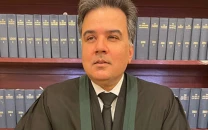Groom arrested over Sound Act 'violation'
.

Police arrested a groom and his best man from a mehndi ceremony in Bahawalnagar for allegedly violating the Sound Act, a move that sparked outrage among locals and was later declared unlawful by the court.
The A-Division Police claimed that the wedding party in Basti Saddr Deen had breached noise regulations by playing loud music.
Acting on this pretext, officers raided the ceremony late at night and detained the groom and his best man while they were still dressed in their wedding attire.
The dramatic arrest caused widespread commotion in the area.
Residents and social activists condemned the police action, calling it an abuse of power and "deeply humiliating" for the families involved.
Witnesses said the groom's relatives repeatedly pleaded with officers not to arrest him, but their appeals were ignored.
According to sources, the groom and his friend spent the entire night in police custody.
The next morning, the day of the wedding, police produced both men before Civil Judge and Area Magistrate Rao Zubair, seeking a 14-day judicial remand.
The court was taken aback to see the groom and best man appear in traditional wedding attire.
Defense counsel Saleem Mahar Advocate argued that the police had acted out of "malice and a desire for attention," disguising the move as a Sound Act violation.
He maintained that playing music at a wedding did not constitute a crime, as the law was intended to prevent speeches or sounds that could incite religious, sectarian, or provincial hatred, not cultural celebrations.
After reviewing the case, the magistrate rejected the police's request for remand and ordered both men to be discharged from the case.
In his written order, the judge highlighted serious procedural flaws, noting that the investigating officer had failed to record statements from independent witnesses and that the complainant himself was also the investigating officer, a clear legal irregularity.
The court further observed that the FIR made no specific reference to any loudspeaker, speakers, or objectionable content that would justify charges under the Sound Act.
"The purpose of this law is to prevent disturbances that threaten public order, not to target joyous events such as weddings," the order stated.




















COMMENTS
Comments are moderated and generally will be posted if they are on-topic and not abusive.
For more information, please see our Comments FAQ